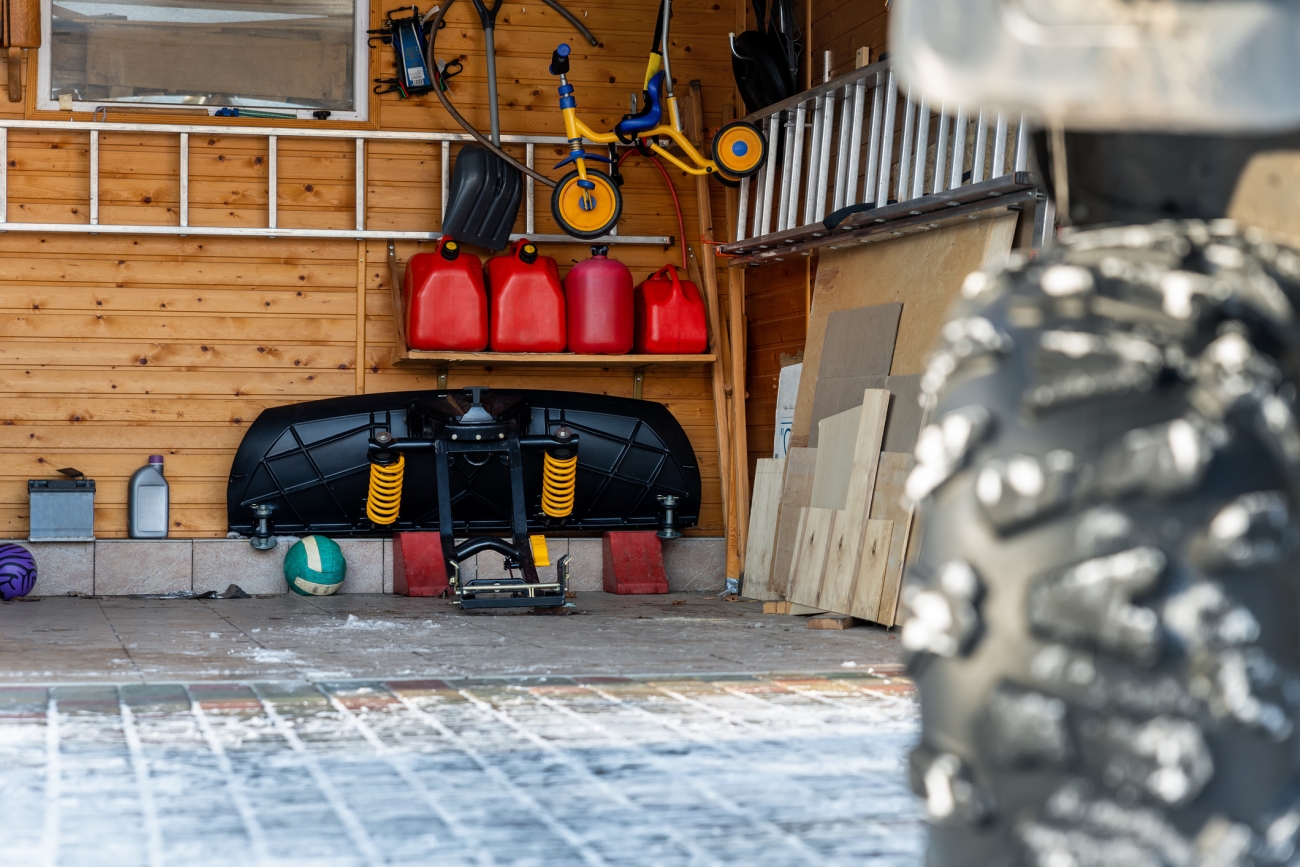Just because no one lives in the garage, don’t make the mistake of storing anything and everything in it. Garages often host pests. Some items are hazardous in the garage. Many things deteriorate when stored someplace with unregulated temperature control.

Dangerous Items
Anything that explodes, acts as a fire accelerant, or poisons people should not be stored in your garage.
1. Propane and Gas
Propane tanks are designed to be as safe as possible but the valves can develop leaks or they aren’t completely closed. Any kind of spark–including a vehicle starting–can cause an explosion.
Gas, diesel, and any other flammable products are much safer stored in a shed away from the house and garage. All flammable products can start fires or act as an accelerant that increases the speed of flame spread and the heat of a fire.
2. Oil-soaked Rags or Paper
Rags, paper towels, and shop wipes soaked in oil or a combination of oil, gas, dirt, solvents, and cleaners can spontaneously combust. Uninsulated garages get very hot in summer adding to the danger. Sparks from grinders, welders, lighters, or a vehicle can also start them on fire.
3. Pesticides and Fertilizer
Pesticides can catch fire. Pressurized cans can explode. Pesticide fires are hot and dangerous. Burning pesticides spread toxic and poisonous liquid and fumes. Pesticides are dangerous even when they do not catch on fire–especially to children.
Even though they do not burn, nitrate-based fertilizers can give off toxic fumes–like nitric oxide, ammonia, or hydrogen chloride. Many plant fertilizers are poisonous to humans if swallowed, inhaled, or even from skin exposure. Keep fertilizers out of reach of children and out of the garage.
Items That Pests Damage
Garages often do not receive the same maintenance as houses–making it easier for pests to get in. Some stored items provide food and nesting for them.
4. Firewood and Construction Lumber
Piles of wood in the garage are food sources for insects and mold. They absorb moisture in a humid garage, and at the same time provide a source of fuel in case of fire. Rodents hide and nest in wood piles. Best to store wood outside under a tarp or in a shed.
5. Books, Files, and Records
Roaches and silverfish eat almost anything–including books and paper. They are attracted to the glue used in bookbinding. Warm humid garages attract pests and increase the possibility of mold growth on paper products.
All paper products absorb moisture. Mold grows on moist paper. Photos stick together, discolor, and tear when separated.
Vinyl records and cardboard sleeves get moldy or can warp in high temperatures. Rodents gnaw at anything. They can make records unplayable.
6. Clothing and Fabrics
Fabrics attract moths that can ruin clothing. Other insects also chew on them. Rodents chew fabric and nest in it. Mold also grows on unprotected fabric. Garages are not safe places for clothes storage.
7. Carpet and Underlayment
Moist rolled up carpet can grow mold. It provides an excellent habitat for bugs and rodents. Mice, rats, and squirrels use soft foam underlayment to line nests.
8. Pet Food
Pet food stored in bags is an invitation to rodents. They chew through bags to get to the food. Bugs will follow. Feces and urine promote mold growth on the food. Temperature changes and high humidity degrade the nutritional value of the food. If pet food must be stored in the garage, make sure it is in plastic or metal containers with tight lids.
Easily Damaged Items
Unheated or uncooled garages can damage many different types of stored items. Leaks or high humidity promote mold growth in the garage.
9. Appliances
Storing unused appliances in the garage can cause corrosion and rust on metal parts. Using them in an unheated garage and a cold climate causes problems.
- Refrigerators. Should work but uses more energy as temperatures fluctuate.
- Freezers. Have a “Climate Class Rating”. Most efficient operating range is usually 50 degrees F to 90 degrees F.
- Washers. May be susceptible to condensation, rust, mold growth, or frozen pipes.
- Dryers. Recommended room temperature is above 40 degrees F. Newer machines may not work in low temperatures.
10. Food
Do not store any food in a garage. If absolutely necessary, store it in sealed plastic containers to deter pests and limit humidity.
11. Canned Food
Home-preserved or factory-canned foods can spoil at sustained temperatures over 75 degrees F. Lids and cans can rust causing potential health problems.
12. Dry Food
Dry foods–like baking supplies, noodles, rice, crackers, and cereal–often become stale and/or moldy. Rodents can easily chew through bags and boxes to contaminate and ruin food supplies.
13. Wine
Wine is best kept in a temperature-controlled environment. Not in the garage where the temperature can fluctuate between freezing and very hot. Wine is quite sensitive. The taste changes when it is subjected to continuous temperature changes.
14. Cardboard
Cardboard–whether the boxes are holding stored items or being saved for later use–absorbs moisture and decomposes. It grows mold. It attracts pests like rodents, roaches, and silverfish. Cardboard boxes are poor protection for stored items–especially when they start growing mold or falling apart. They do not deter pests so anything stored in them will be infested.


